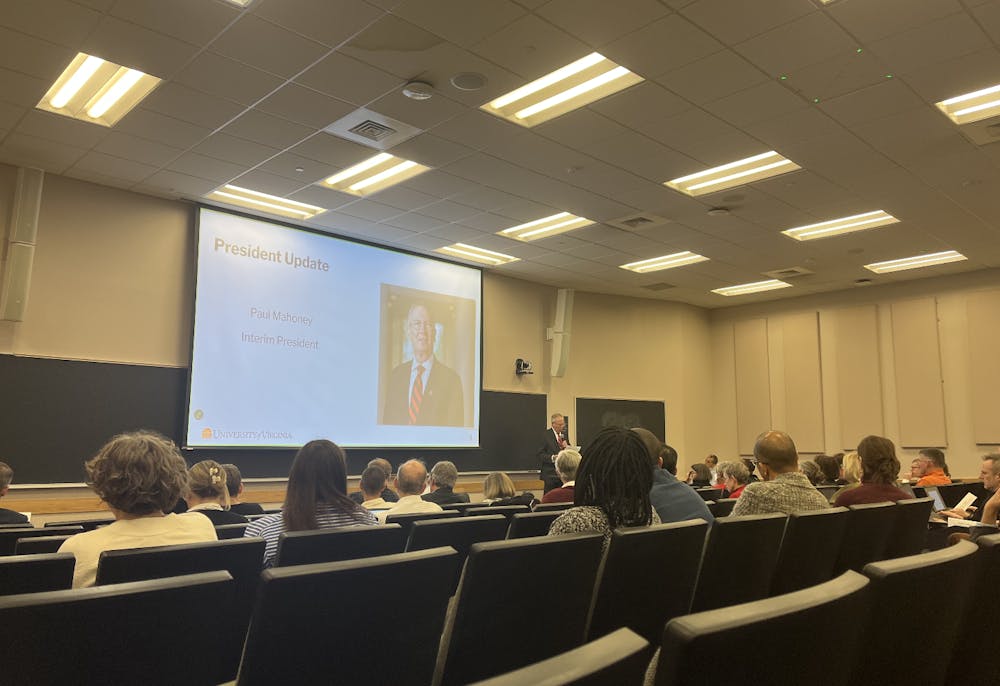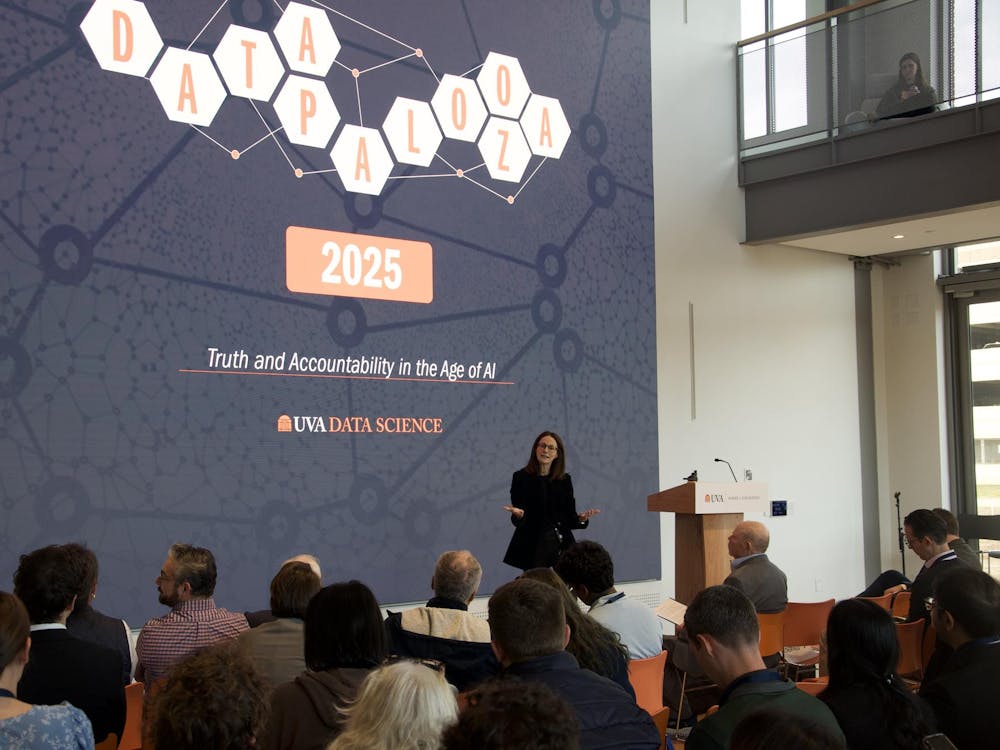The Faculty Senate met Friday to pass a resolution which requested that the University pause the ongoing search for the tenth president until all seats on the Board of Visitors are filled. The same resolution also called for Board Rector Rachel Sheridan and Vice Rector Porter Wilkinson to resign. Senators also heard from interim University President Paul Mahoney, who discussed the University’s Oct. 22 agreement with the Justice Department.
The resolution was added to the agenda after an emergency meeting of the Senate’s Executive Committee Thursday. It outlined the Senate’s objections to the rector and vice rector’s decision not to communicate with the Faculty Senate directly.
“The rector and vice rector have refused multiple requests for meetings with the Faculty Senate …” the resolution read. “This refusal demonstrates a lack of courage, leadership and accountability in times that are anything but ordinary.”
Following the decision to add this resolution to the agenda, Sheridan sent a letter to the Faculty Senate Thursday which gave more details of the circumstances around a series of seven Justice Department investigations into the University and former University President Jim Ryan’s subsequent resignation. In this letter, Sheridan noted that she had been unable to provide more answers about these matters while these investigations were ongoing.
Sheridan also noted that because an agreement with the Justice Department which suspended the remaining investigations was signed Oct. 22, she could more openly speak about the circumstances of the resignation. The letter was meant to share more details, but according to Faculty Senate Chair Jeri Seidman, Sheridan and Wilkinson declined an invitation to attend Friday’s meeting and speak directly with senators.
Seidman emphasized that Sheridan did not provide information regarding Ryan’s resignation and the Justice Department investigations until this resolution was added to the agenda, although the agreement was signed more than three weeks ago.
“Regardless of what the letter stated, it was too little too late. We have been asking questions since July, and it wasn't until there was a motion calling for their resignations before we got answers … The agreement was signed for 21 days, 22 days before they provided answers,” Seidman said. “If they wanted to be transparent, they had ample opportunity.”
Several University faculty members expressed their support of the resolution. Matthew Hedstrom, Faculty Senator and religious studies associate professor, expressed his belief that Ryan’s resignation was an “oust” orchestrated purposefully by Rector Sheridan and Vice Rector Wilkinson before they assumed their positions this summer. This followed Ryan’s decision to send a letter to the Faculty Senate Friday morning which outlined his own perspective of the investigations and his resignation, and differed significantly from Sheridan’s account.
“I think we now know … that actually the Rector, the Vice Rector, and others on the board conspired to oust Jim Ryan, and that they made the decision to leverage pressure from the Department of Justice to enact that ouster,” Hedstrom said.
Hudson Golino, Faculty Senator and psychology associate professor, expressed a similar sentiment to Hedstrom, believing, too, that the shifts in University leadership have been more bitterly motivated.
“This University had suffered a coup,” Golino said. “This University was part of a hostile takeover by private individuals, and this is a public institution in the state of Virginia. We should never allow such a thing to happen.”
Despite support for passing the resolution, some Faculty Senators expressed a desire to delay the vote. Rich Hynes, Faculty Senator and Law professor, said that there was not yet enough available information to make this decision given that only two accounts, those of Sheridan and Ryan, have been provided.
“We got two radically different accounts of the version of the events of last summer, and we don’t have the versions of several other people who are referred to in the two letters,” Hynes said. “Delaying our decision would not only allow us to craft a resolution that better reflects what we are actually concerned about now, but also allows for these parties to come forward and allows for other evidence to emerge.”
The Cavalier Daily confirmed with former Rector Robert Hardie, who is mentioned in both letters from Sheridan and Ryan, that he fully agrees with Ryan’s account of the events — however, others who were involved in the resignation have not responded to requests for comment.
The same resolution also calls for the University to suspend the presidential search until all seats on the Board are filled. This follows two Senate Privileges and Elections Committee votes which rejected five of Gov. Glenn Youngkin’s appointees to the Board and a letter from Gov.-elect Abigail Spanberger which asked the University to suspend the search until she was in office and could fill these vacancies.
The Senate chose not to delay the vote, and the resolution passed with 41 in favor, 17 opposed and 2 abstentions.
After this first resolution was passed, the Faculty Senate discussed a second resolution focused more specifically on the University’s deal with the Justice Department, which ultimately, senators chose to delay a vote on. It claimed that this agreement encroaches on the University’s independence, and expressed “deep disappointment” in Mahoney for not seeking advice on the agreement from the Faculty Senate prior to signing. While some senators were in favor of the resolution, others noted that Mahoney has continued to meet with them and listen to their concerns.
During this meeting, the Faculty Senate heard directly from interim President Mahoney. Arriving with a police escort, Mahoney began with a prepared statement and then answered questions from Faculty Senators which had been previously sent to Seidman and focused on the agreement with the Justice Department.
Mahoney’s statement explained the events that led to the agreement and his reasoning for each decision along the way. The interim president stressed again for the Faculty Senate his belief that the University “did the right thing” with regard to signing the agreement. In addressing the University’s choice to not take up litigation with the Justice Department, he emphasized Harvard’s experience as being an anomaly rather than a proper representation for how it may look for the University.
“I fear that Harvard’s quick victory in court may have created unrealistic expectations about how that litigation would go,” Mahoney said. “I don’t think we could count on being so lucky.”
In response to a question posed by Senator Andrew Block about whether the University would continue to pursue diversity, Mahoney said encouraging diversity will continue.
“I define diversity very broadly to include various perspectives, various opinions, various life circumstances, various backgrounds, various challenges overcome, etc,” Mahoney said. “I think we will continue to take all of those things into account. I think there’s nothing in Title VI that tells us we can’t take those things into account. And so that’s what we will do.”
He also noted that before signing the agreement, he sent information to the Justice Department regarding compliance with federal law and made a request for the Department to drop all seven investigations. However, this only resolved two of the investigations, and the Justice Department said there were still outstanding issues, which led to the agreement which suspends the remaining five.
“At that point in time, walking away from the negotiations was not an option,” Mahoney said. “The DOJ had agreed to pause its investigations only because it believed that we were engaged in serious and good faith negotiations.”
As the Faculty Senate moves forward, it will reconsider the deferred resolution which expressed concern with the agreement and has shared the passed resolution with Sheridan. When Spanberger steps into office in January, she will have the power to appoint and remove members of the Board, if she wishes.
In her letter, Sheridan expressed hope that the Board and the Faculty Senate could work together “constructively” in the future despite disagreements.
“As we join together to protect our independence, our principles, and our mission, it is more important than ever before that we be able to work together and not at cross purposes,” Sheridan wrote. “I hope that knowing more of the facts will allow the Faculty Senate to exercise its leadership in a manner that is best for all faculty and the University. The Board looks forward to it.”
Seidman told The Cavalier Daily that it would be challenging to restore community confidence in Sheridan and Wilkinson’s leadership.
“They're feeling the pressure in a number of ways,” Seidman said. “We had outlined no confidence months ago, but in that no confidence vote, we outlined steps to return to confidence, and none of those steps were taken. This was sort of a last ditch statement from the Senate that we have given up on that path to trust ever being restored.”
The next full Faculty Senate meeting will take place Friday, Dec. 12.







